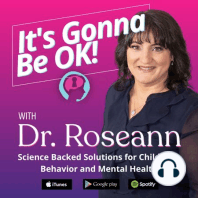15 min listen

31: How to Deal with Family Members Who Don't Understand Your Child's Diagnosis
FromScience Backed Solutions for Children’s Behavior and Mental Health
31: How to Deal with Family Members Who Don't Understand Your Child's Diagnosis
FromScience Backed Solutions for Children’s Behavior and Mental Health
ratings:
Length:
10 minutes
Released:
Mar 6, 2023
Format:
Podcast episode
Description
Helping your child understand their diagnosis is already a challenging task to do as it is. So, let's not make it any harder for you, your children, or your family by tolerating the acts and opinions of family members who don't understand your child's diagnosis. It's not just your child who has to be educated about these things. It would help if you also learn how to deal with family members who don't understand your child's diagnosis because they'll always have an opinion. Even random people outside have an opinion, but it's not their business to mind. Let's dive in and learn how to set boundaries for you, your children, and your family.A lot of women, in particular, are not great at setting boundariesWhile mentoring many people, I've encountered employees, especially women, who find it difficult to set boundaries, which is understandable. Everyone has an opinion when they see your child acting differently. Sometimes, they voice out these opinions to you. Other times, they don't.Sometimes, people give you their opinion out of love, and they think that's the right thing to do. But then, you get affected by what they say, which would also affect your parenting skills and how you help your children deal with their diagnosis. That's why there's a need for us to set up boundaries.How do you deal with people who don't understand dyslexia?You tend to be overwhelmed when your family members' opinions get to you. But it would be best if you learned how to manage that. Otherwise, you may go down the rabbit hole or find yourself searching random things about your child's diagnosis in the middle of the night on Google.I have firsthand experience in dealing with a dyslexic child who also has PANS. Everyone might think they already know what dyslexia is, but they don't. It's an auditory processing problem and not a visual processing problem, which is a common misconception.It's not your job to sort out the stuff your family members come at you with. However, you can offer your insights and inform them how you're helping your child with their diagnosis. Tell them you're working with a specialist or getting professional help. How to deal with people who don't want to engage in conversationWe've said that sharing information with others is not your job. It's important to set boundaries, especially when dealing with people who have several opinions but don't have the intent to listen and want to refrain from engaging in conversation.Putting up boundaries will change you positively because sometimes, you're just never going to win with certain people when trying to engage with them in a conversation. Understanding and communication should be a two-way thing, not just one-sided.Aside from letting them know that they've crossed the line when trying to open up your mind to certain things regarding your child's diagnosis, startling statements also work well. Sometimes, you must respectfully say that the treatment you're giving your child is science-backed and works well for your child and the rest of your family.When you set a boundary, sometimes people get upsetSometimes, people don't know when they've already crossed the line. So when we set boundaries, they get upset. But for some reason, it's always about them and never about you. That's when you realize just how important setting boundaries is. But if you have a family member willing to learn, share the information they need. Great conversations help enlighten them further about your child's situation. We must understand where they're coming from – maybe out of love or concern – and they want to help.No matter where you are in your journey, we have resources to help you:Mentioned in this episode:Is It ADHD or Something Else? Take the Quiz to find...
Released:
Mar 6, 2023
Format:
Podcast episode
Titles in the series (100)
05: What is Neurofeedback and How Does It Work? by Science Backed Solutions for Children’s Behavior and Mental Health